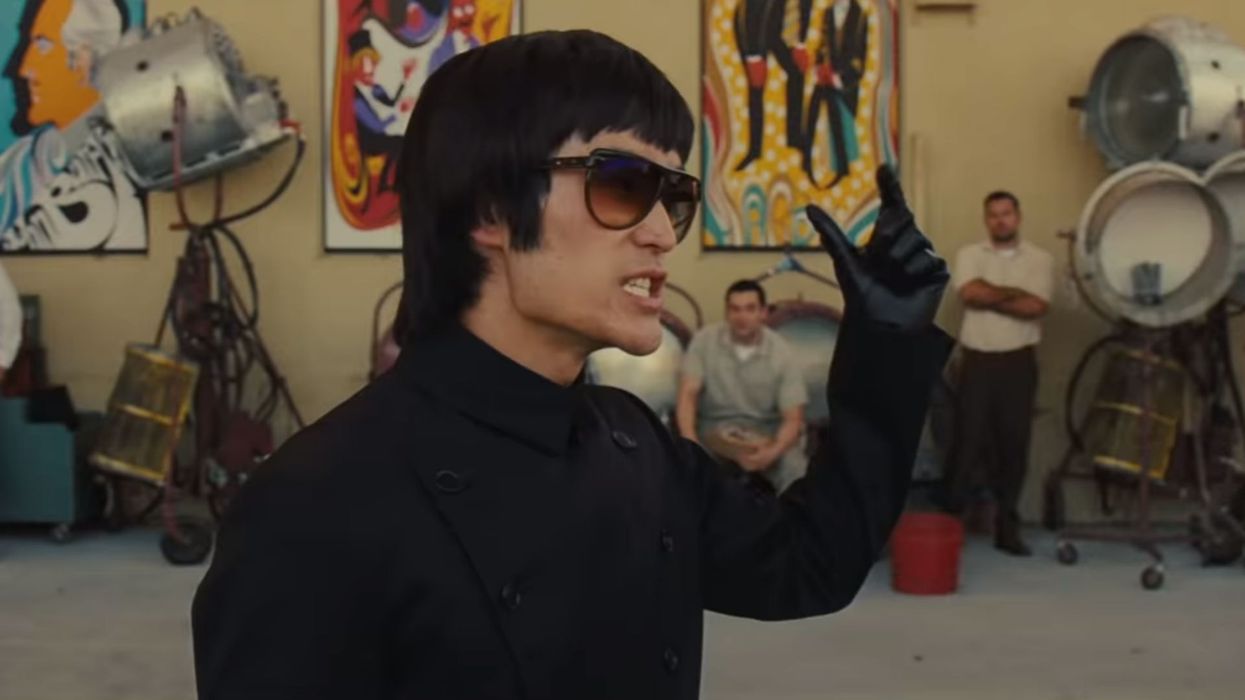Tarantino Hits Back At 'Hollywood's' Bruce Lee Controversy
The Once Upon a Time In Hollywood director has some thoughts about how people are reacting to his new movie.

Film Twitter has been on the verge of obsessive behavior concerning Once Upon a Time In Hollywood and its revisionist history/nostalgic tour through the last glorious gasps of 1969 Hollywood. When fans aren't talking about Quentin Tarantino's take on the period, or Brad Pitt and Leonardo DiCaprio's exceptional performances, or that ending, they're sounding off on Bruce Lee's role in the movie.
Mike Moh's Lee gets into a small brawl with Brad Pitt's stuntman, Cliff Booth, where the latter gives the former as good as he gets. The fight ends in a draw (but that wasn't always the plan in the script) and the scene has sparked considerable controversy regarding how Tarantino uses an historical figure like Lee in an effort to service his main character, Cliff, by showing that the stuntman is the last man with whom to fu** if he can go toe-to-toe with Mr. Enter the Dragon. Tarantino spoke with The Hollywood Reporter about this choice, and how Lee's depiction comes off as "arrogant" -- which Lee was in real-life to a degree, according to those that know him:
"The way he was talking, I didn’t just make a lot of that up. I heard him say things like that, to that effect. If people are saying, 'Well, he never said he could beat up Muhammad Ali,' well yeah, he did. Not only did he say that, but his wife, Linda Lee, said that in her first biography I ever read ... She absolutely said it."
As for the whole debate around could Stuntman Cliff really beat up Bruce Lee? Yup, QT has an opinion or three:
"Brad would not be able to beat up Bruce Lee, but Cliff maybe could. If you ask me the question, 'Who would win in a fight: Bruce Lee or Dracula?' It’s the same question. It's a fictional character. If I say Cliff can beat Bruce Lee up, he's a fictional character so he could beat Bruce Lee up."
The best part about all this "controversy" is the insight it offers on the level of backstory writer-director Tarantino invested in the creation of Cliff. We may not know any of this if it wasn't for the blowback the Lee-Booth fight has received:
"The reality of the situation is this: Cliff is a Green Beret. He has killed many men in WWII in hand-to-hand combat. What Bruce Lee is talking about in the whole thing is that he admires warriors. He admires combat, and boxing is a closer approximation of combat as a sport. Cliff is not part of the sport that is like combat, he is a warrior. He is a combat person.
If Cliff were fighting Bruce Lee in a martial arts tournament in Madison Square Garden, Bruce would kill him. But if Cliff and Bruce were fighting in the jungles of the Philippines, in a hand-to-hand combat fight, Cliff would kill him."
First, we would so watch a Cliff Booth-as-a-Green-Beret origin story movie. Second, this backstory that Tarantino created, while not something we saw explicitly on-screen, it is important as a tool for the actor and filmmaker to put themselves in Cliff's shoes to help ground the extraordinary event of fighting Bruce Lee in some sense of emotional reality. It makes narrative sense for the hero of your movie to be serviced this way, and writers rarely have to defend their choices or legwork that went into them to such a degree after the fact. It's like having the internet over your shoulder as you make choices and they complain about them in real-time before you have a chance to fine-tune or shape more to whatever your desired intent is. Tarantino's creative choices are being put through that gauntlet post-release, sparking him to retro-actively go back and defend his choices because a very vocal minority is sparking headlines.
While not all of us may understand or respect a filmmaker's choices, we can at least make it easier on ourselves by accepting them. As appreciated as it is to get this level of insight, and for writers to see the importance of backstory when shaping characters and worlds, we wish we came about it through less heightened circumstances.
How much do you devote to shaping backstory for your characters? What is your process? Let us know in the comments.
Source: THR











